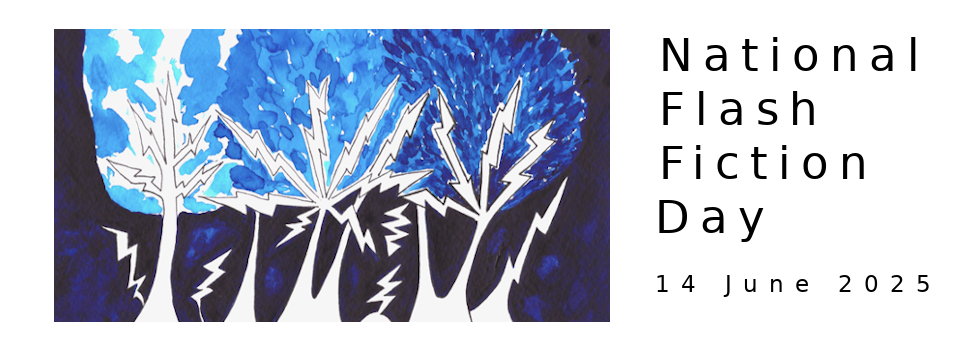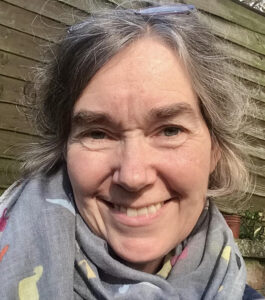National Flash Fiction Day is celebrating its 10th Anniversary on Saturday, 26 June 2021, and to mark the occasion we’ve created a brand new Novella-in-Flash Award which is accepting submissions until 31 October 2021!
We are incredibly excited to have Sophie van Llewyn, author of Bottled Goods (long listed for the Women’s Prize for Fiction) as our inaugural judge. In this interview, Sophie talks about the novella-in-flash form, her experience writing Bottled Goods, and what she's looking for in a Novella-in-Flash Award submission....
Q: Can you share your definition of what makes a novella-in-flash and what the form brings to both writers and readers?
SvL: The novella-in-flash is such a fascinating form and it opens a universe of possibilities for both writer and reader. It’s a longer form of fiction that’s made up of multiple flash fictions revealing an overarching story arc.
So on the one hand, there’s the incredible punch in the gut packed by flash fiction. On the other hand, it’s easier for the reader to move from flash to flash, since the setting and characters often recur. I often find that when I read a collection, I need to take a break after a few flashes if each one moves between characters, themes, setting and tone. But a novella-in-flash can be read within a single session — there’s this compulsion to follow the book’s forward movement.
Q: We’d love to know why and how you decided to write Bottled Goods as a Novella-in-Flash.
SvL: Bottled Goods started with a character, a setting. A young woman being questioned by the border authorities of communist Romania. Something very precious, hidden in her purse. I tried to write the story as a flash fiction, but 1,000 words weren’t enough. As the days passed, the story grew in all possible directions. More characters emerged, started clashing. I could see the storyline shaping up.
So I tried to write a novel, then, but it didn’t work out. I was losing momentum, getting stuck after a few pages.
Discovering the form of the novella-in-flash was a revelation. I wrote a few flashes that encompassed a few incidents of my new storyline and then I wrote more flashes to fill in the blanks. I dedicated more flashes to the setting, to the magical elements. Once I’d struck the right form, the book really wrote itself.
Q: Do you have advice for our entrants of what to be careful about when writing NiFs?
SvL: Don’t overcrowd your novella-in-flash with characters. Too many episodic appearances can confuse the reader. So make sure that each character pulls their weight and if you do decide to write a flash from the POV of an episodic character, make sure you do it for all the right reasons.
A novella-in-flash can pack a lot of punch and a lot of plot in a word count much smaller than a novel, but it’s important that it doesn’t feel rushed. Too many loose threads, too many episodic characters can make it feel that way.
Q: Could you share some key features you’re looking for in entries with some examples from published NiFs, including your own
SvL: No matter what the theme, setting, tone, even the genre of the novella-in-flash, character growth and development are important aspects. A character who grows, who learns, who changes will power a story that’s satisfying for the reader. Three Sisters of Stone by Stephanie Carty and When It’s Not Called Making Love by Karen Jones are great go-to examples if you’d like to see how it’s done.
Use the white space. Readers of flash fiction are used to filling in the blanks, so don’t be afraid to take leaps in time, or to go back and forth in time (like in Charmaine Wilkerson’s How to Make a Window Snake).
Also, why not take risks? The novella-in-flash is such a fluid form, so why not define your own boundaries of story arc and what character development means?

 Alison Woodhouse is a writer and teacher. Her flash fiction and short stories have been widely published and anthologised, including In the Kitchen (Dahlia Press), With One Eyes on the Cows (Bath flash fiction), Leicester Writes 2018 & 2020 (Dahlia Press), The Real Jazz Baby (Reflex), A Girl’s Guide go Fishing (Reflex), National Flash Fiction Day Anthologies and Life on the Margins (Scottish Arts Trust Story Awards). She has won a number of story competitions including Flash 500, Hastings, HISSAC (flash & short story), NFFD micro, Biffy50, Farnham, Adhoc and Limnisa and been placed in many others. In 2019 she was awarded an MA with Distinction in Creative Writing from Bath Spa University. Her debut novella-in-flash The House on the Corner is published by AdHoc Fiction. Contact her at:
Alison Woodhouse is a writer and teacher. Her flash fiction and short stories have been widely published and anthologised, including In the Kitchen (Dahlia Press), With One Eyes on the Cows (Bath flash fiction), Leicester Writes 2018 & 2020 (Dahlia Press), The Real Jazz Baby (Reflex), A Girl’s Guide go Fishing (Reflex), National Flash Fiction Day Anthologies and Life on the Margins (Scottish Arts Trust Story Awards). She has won a number of story competitions including Flash 500, Hastings, HISSAC (flash & short story), NFFD micro, Biffy50, Farnham, Adhoc and Limnisa and been placed in many others. In 2019 she was awarded an MA with Distinction in Creative Writing from Bath Spa University. Her debut novella-in-flash The House on the Corner is published by AdHoc Fiction. Contact her at:
 Sharon Telfer cut her micro teeth on the weekly @AdHocFiction competitions. Her flash fiction has won prizes, including the Bath Flash Fiction Award (2020 and 2016) and the Reflex Flash Fiction Prize (2018). Her stories have also been chosen for the ‘BIFFY50’ (2019 and 2020) and Best Microfiction 2019. She’s a founding editor at FlashBack Fiction, the online litmag showcasing historical flash.
Sharon Telfer cut her micro teeth on the weekly @AdHocFiction competitions. Her flash fiction has won prizes, including the Bath Flash Fiction Award (2020 and 2016) and the Reflex Flash Fiction Prize (2018). Her stories have also been chosen for the ‘BIFFY50’ (2019 and 2020) and Best Microfiction 2019. She’s a founding editor at FlashBack Fiction, the online litmag showcasing historical flash.